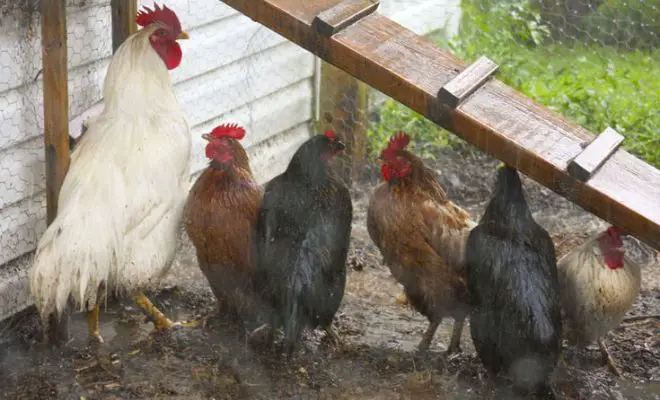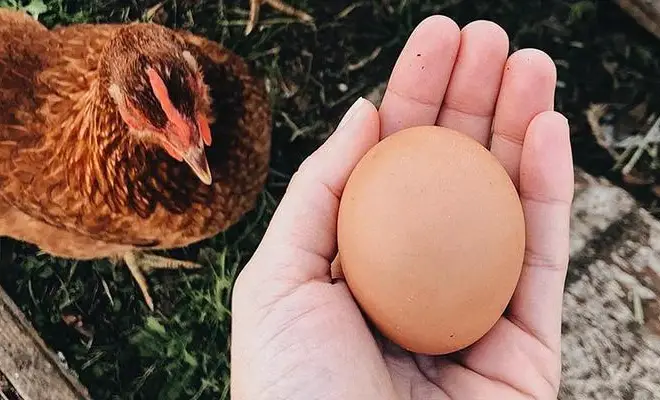Rainfall & Avian Health: Are Chickens Safe in the Rain?

Have you ever watched chickens pecking around in the rain? You might wonder are chickens safe in the rain?
Yes, a little rain won’t hurt your feathered friends! Chickens actually have a built-in raincoat – their feathers! These amazing feathers help repel water, keeping them mostly dry. But while a light sprinkle is no problem, heavy rain or cold, wet weather becomes risky for chickens. Their wet feathers lose their insulating power. So, it makes them uncomfortable.
So, how do you keep your chickens safe during rainy days? Don’t worry, we’ll cover everything about chickens’ soaking wet condition!
Table of Contents
Are Chickens Safe in the Rain? Is It OK for Them?

Yes, rain itself isn’t inherently dangerous for chickens.
They can sense a light sprinkle and even enjoy it. They take the opportunity as a forager to peck at exposed worms. They mostly find earthworms on rainy days!
When the rain gets heavy or the temperature drops, they know to head for their coop for some dry snuggles. A good coop provides a cozy escape from the downpour. But if the rain lets up, they always head back out to explore.
However, there are some factors to consider for their safety and well-being.
- Temperature: Chickens get cold if they get wet in chilly weather. Their feathers help trap air to stay warm, but if they’re wet, they can’t fluff up their feathers as effectively.
- Wetness Level: A light rain won’t bother chickens much, but a heavy downpour or prolonged exposure to rain will soak them completely.
- Chicken Breed: Some breeds, like Silkies, have feathers that aren’t very water-resistant and shouldn’t be left out in the rain.
- Coop Conditions: A damp coop leads to mold and respiratory problems for chickens. Make sure their coop has good ventilation and is properly cleaned.
Can Chickens Get Sick from the Rain?
No, the rain itself won’t directly make chickens sick.
But the wet and muddy conditions contribute to some health problems. Here’s how.
- Moisture and Coop Environment: Stagnant water and dampness in the coop lead to mold and mildew growth. Spores from these irritate chickens’ respiratory systems and cause infections.
- Parasites: Muddy conditions make it difficult for chickens to dust and bathe, which they use to get rid of mites and lice. With more moisture, these parasites thrive.
- Contaminated Water: Chickens are often tempted to drink from puddles, especially if fresh water isn’t readily available. Puddles harbor bacteria, worms, and coccidia, all of which make chickens sick.
- Cold and Wetness: Cold stress can negatively impact the immune function of chickens. It will make them more susceptible to contracting infectious diseases.
Can Chickens Die from Being Wet?

No, getting wet itself won’t directly cause the death of an adult chicken.
Chickens have natural oils on their feathers that make them water-resistant. However, there are situations where being wet is dangerous.
Cold and Wet
The biggest risk comes from a combination of cold weather and wetness. Wet feathers lose their insulating ability, making chickens lose body heat faster. This leads to hypothermia, which is fatal.
Drowning
If a chicken gets very wet and cannot find dry shelter, especially young chicks or those with limited mobility, their feathers become waterlogged. This makes it difficult to swim or stay afloat, increasing the risk of drowning.
Chicks
Baby chicks with downy feathers have no waterproofing. So, they’re at high risk of death. It’s because they get chilled very quickly if they get wet. Staying for a long with such a condition leads to even death.
Should Chicken be in the Rain?
Yes, chickens can and should be in the gentle Seattle rain.
Chickens enjoy the outdoors when it rains. So, do chickens like the rain? Yes, chickens like rains until it’s heavy rainfall. They run away due to heavy rain. Let’s make it clean below!

Light Rain, No Worries
A light sprinkle is no problem for chickens. Their feathers act like natural raincoats, keeping them dry. They even enjoy the damp ground, perfect for a spot of worm hunting!
Heavy Rain is a Sign of Danger!
Long periods of heavy rain or cold weather are dangerous. Wet feathers make it hard for chickens to stay warm. If the rain gets heavy, their cozy coop becomes a haven.
How Long Can Chickens Get Sick from the Rain?
The duration of exposure to wet and cold conditions contributes to health problems in chickens.
Wet feathers lose their insulating ability, making chickens lose body heat faster. This leads to hypothermia, which weakens their immune system. It’s what makes them more susceptible to illnesses like respiratory infections.
In mild cold and wetness, they’ll be okay for a short while. But prolonged exposure (several hours) is risky.
Also, the chicks, sick birds, and breeds with poor feather resistance are more vulnerable. They get sick much faster (within hours) in cold rain.
Related Reads:
Protection from Rain: What to Do with Chickens When It Rains?

Chickens can tolerate rain to some extent. So, it’s important to keep them safe during wet weather. Follow the guidelines I am including below!
1. Provide a Dry Escape
Make sure your chickens have a cozy, dry coop to take shelter in.
If they’re familiar with the coop, they’ll likely use it instinctively when rain arrives. However, keep an eye on them, especially newer birds who are not familiar with the routine.
2. Seal Up the Coop
A well-sealed coop is essential!
It’s for keeping out drafts and preventing leaks during rain. Drafts make chickens feel colder even if they’re dry, and leaks create damp conditions that are unhealthy for your flock.
3. Create a Dry Haven with Bedding
Use a deep layer of dry straw or wood shavings as bedding for your coop.
This creates a comfortable, dry area for your chickens to rest and avoid muddy puddles. Fresh, dry bedding also helps keep their feet warm.
4. Be Proactive with Maintenance
Regularly inspect your coop for leaks, cracks, or any damage that could allow rain or drafts inside.
Repair any problems promptly to maintain a dry and comfortable environment for your feathered friends.
See the following video sharing if rain is safe for chickens.
3 Reasons Why Are My Chickens Standing in the Rain
Sometimes you’ll see chickens standing in the rain. Well, there are a few reasons behind this!
- It must be the harmless light rain that your chickens are enjoying.
- They are standing in the rain to enjoy fresh air and sunshine.
- If their coop isn’t easily accessible or comfortable, they hesitate to go inside when it’s raining.
FAQs
Expecting more things to learn? Here is a FAQ section to answer your mind!
Q. Can 6-week-old chicks be in the rain?
No, 6-week-old chicks shouldn’t get in the rain. Their downy feathers aren’t waterproof.
Q. Why does my chicken run smell after it rains?
Rain mix with droppings and stir up the bedding. It causes strong ammonia smells. Regularly cleaning the coop and using fresh bedding help.
Q. Do chickens get scared of thunder?
Loud noises like thunder startle chickens. Providing a sheltered area in their run helps them feel secure during storms.
Q. Do chickens feel cold in the rain?
Yes, chickens feel cold in the rain, especially if it’s prolonged or the weather is chilly. Wet feathers lose their insulating ability.
Q. Does rain affect chickens laying eggs?
Heavy rain or cold weather can affect egg production indirectly. Stress from uncomfortable conditions temporarily reduces egg laying.
Final Word
So, a little rain won’t dampen your chickens and harm them! Their feathers do a great job of keeping them dry in light showers. But remember, heavy rain or cold weather is dangerous. Wet chickens lose their ability to stay warm.
The key is to provide a cozy, dry coop for your feathered friends. A well-sealed coop with plenty of fresh bedding plays a role, too. By following these simple tips, you can ensure your chickens stay safe in such weather!






